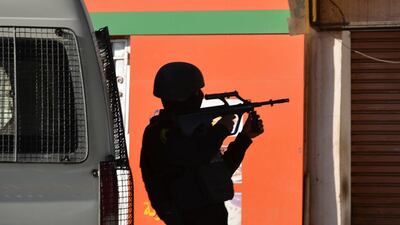TUNIS, TUNISIA // At least 45 people were killed on Monday near Tunisia’s border with Libya in one of the deadliest clashes seen so far between Tunisian forces and extremist attackers.
The fighting in the border town of Ben Guerdane in eastern Tunisia comes amid increasing concern that violent extremism in Libya could destabilise the region.
The government closed its two border crossings with Libya because of the attack that left 28 “terrorists”, seven civilians and 10 members of Tunisia’s security forces dead, the Tunisian interior and defence ministries said. A 12-year-old girl was among those who were killed.
President Beji Caid Sebsi denounced Monday’s attacks on police and army posts near his country’s border with Libya.
He called the attacks “unprecedented and coordinated”, and said that they could have been aimed at controlling the region in order to proclaim a “new [jihadist] province”.
“The Tunisian people are at war with this barbarism and with these rats and we will exterminate them ... definitively,” said Mr Caid Sebsi.
Tunisia has seen an emergence of radical Islam since the 2011 uprising that toppled longtime autocratic strongman Zine El Abidine Ben Ali who suppressed opponents including extremists.
In recent years a large number of Tunisians have joined ISIL in Libya, where authorities say they have been trained to carry out attacks at home.
Five years after the uprising that led to the ousting and killing of longtime autocrat Muammar Qaddafi in 2011, Libya’s chaos has allowed ISIL to take control of several cities.
The divided country is ruled by two parliaments: an internationally recognised body based in the eastern city of Tobruk and a rival government, backed by allied militias, that controls the capital of Tripoli.
Tunisia’s fledgling democratic government is especially worried about the presence of ISIL in Libya after dozens of tourists were killed in extremist attacks in the country last year.
On Monday, gunmen targeted a police station and military facilities at dawn in Ben Guerdane, interior ministry spokesman Yasser Mosbah said. A night curfew has been ordered in Ben Guerdane until further notice.
France’s foreign ministry condemned the attacks and identified the gunmen as “terrorists coming from Libyan territory”.
“This attack is just reinforcing the urgent need for a political solution in Libya,” the ministry said, adding that the country was targeted because of its “exemplary democratic transition”.
Hospital official Abdelkrim Sakroud said that three corpses had been brought in, including that of the 12-year-old girl.
The Tunisian military sent reinforcements and helicopters to the area around Ben Guerdane and authorities were hunting several attackers still at large. Officials urged residents to stay indoors.
Last week, Tunisian security forces killed five heavily-armed men in an hours-long firefight after they crossed into the country from Libya with a larger group. Tunisian security forces had been placed on alert based on “precise information” of possible border infiltrations following a February 19 US raid on an ISIL camp near the Libyan town of Sabratha, not far from the Tunisian border.
Defence minister Farhat Horchani said last week that German and American security experts were coming to Tunis on Monday to help Tunisia devise a new electronic video-surveillance system of its border with Libya.
Tunisia was targeted last year by three ISIL-claimed attacks that left 70 people dead. According to Tunisian authorities, the attackers had been trained in Libya.
* Associated Press and Agence France-Presse

